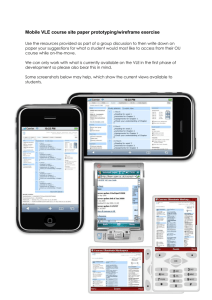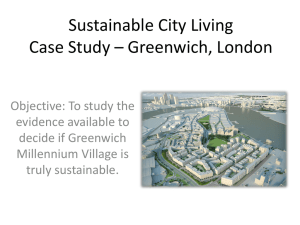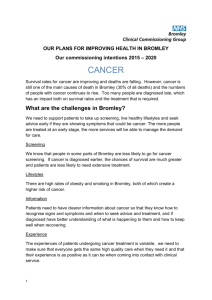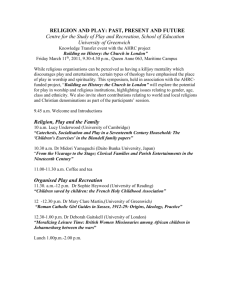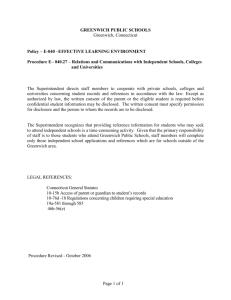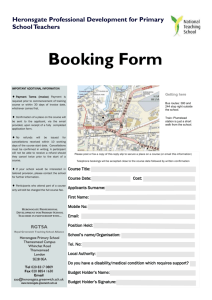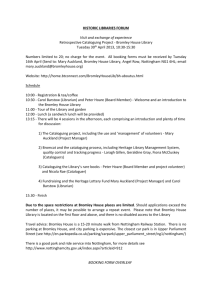the ict curriculum area - Bromley College, Foundation Degree Digital
advertisement
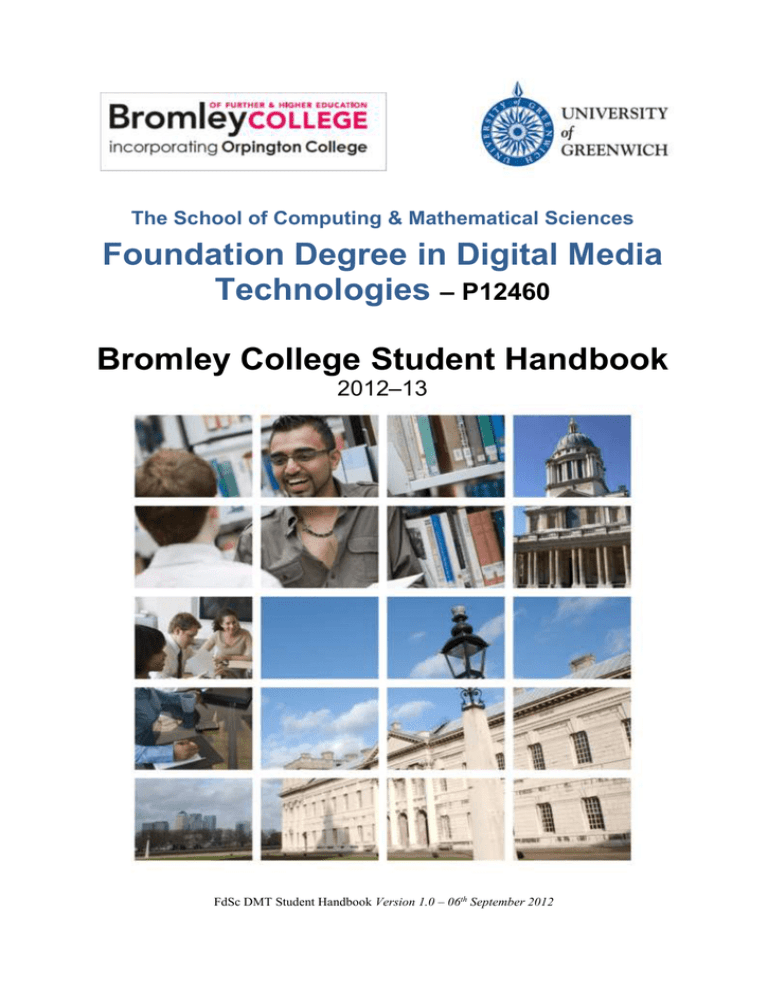
The School of Computing & Mathematical Sciences Foundation Degree in Digital Media Technologies – P12460 Bromley College Student Handbook 2012–13 FdSc DMT Student Handbook Version 1.0 – 06th September 2012 WELCOME TO THE ICT CURRICULUM AREA Foundation Degree in Digital Media Technologies In Partnership This booklet contains general information about the College and more specific information on the Programme. We hope that you will find it useful. If you have any queries please do not hesitate to ask a member of staff for further information. Please not that this booklet is intended to be read in conjunction with the School of Engineering online student handbook. This online copy supplements any hard copy handbooks which may be issued to students. This document is prepared according to the University QA guidelines 2011 section D8 - Essential Information for Students. This Page Intentionally Left Blank 1. The Host School 1.1 School of Computing and Mathematical Sciences Link Tutor: DMT Programme Coordinator: Dr Chaoying Ma Tel: (020 8331) 8596 Email: C.Ma@greenwich.ac.uk Room: QM314 Jesmond Lewis Tel: (020 8331) 8334 Email: J.C.Lewis@greenwich.ac.uk Room: QM360 1.2 Bromley College Programme Team: Name Contact Details Courses Taught Ti Majekodunmi (Programme Leader/Lecturer) Room 215 Tel: 020 8295 7000 x7171 Email: ti.majekodunmi@bromley.ac.uk Digital Media Foundations Visual Storytelling Digital Media Production Clive Gould (Lecturer) Room 114 Tel: 020 8295 7000 x7144 Email: clive.gould@bromley.ac.uk Dave Kite (Lecturer) Room 215 Tel: 020 8295 7000 x7171 Email: dave.kite@bromley.ac.uk Digital Media Computing and Programming Work Based Learning Project 1 Web Technologies Work Based Learning Project 2 3D Animation 1.2.1 Programme Structures: Level 4 5 Comp 1595 1472 1478 1314 1597 1479 1321 1289 Course Title Digital Media Foundations Visual Storytelling Work Based Learning Project 1 Digital Media Computing and Programming Digital Media Production Work Based Learning Project 2 Web Technologies 3D Animation Designated Tutor Ti Majekodunmi Ti Majekodunmi Clive Gould Clive Gould Ti Majekodunmi Clive Gould Clive Gould Dave Kite Copies of the above course definitions can be found on the CMS Website at: http://www.cms.gre.ac.uk/undergraduate/DMTfd.asp Page 1 Bromley College School Office: Room G17 Tel: 020 8295 7040 Text: 07940 487747 Email: g17@bromley.ac.uk 2. Programme details 2.1 Awards • FdSc Digital Media Technologies 2.2 Modes of Study • • 2 years full-time over a standard academic year Part-time (see section 3) 3. Permitted length of registration The part-time structure is for the two-year programme, however after discussion with the Programme Leader and under individual circumstances students may take a minimum of 30 credits in one year. This allows part-time students to take between two and six years to complete the FdSc, providing the flexibility required meet the needs of both students and their employers. 4. Programme Specification 4.1 Aims and Outcomes This course seeks to bring together the many areas that affect the design and development of multimedia systems. It is broad based, covering technical, theoretical and design areas. You’ll learn how to: Create and handle images (drawing and photographic); Produce computer animation (2D and 3D); Make digital video and sound for the web, CD and DVD; Create and manage websites; Program and design in various commercial software environments; Use principles of design and analysis to ensure you work is of the highest standard; Communicate effectively with business, computing and design professionals; Apply theoretical issues to a practical work environment. 4.2 Progression Progression from the Foundation Degree to an Honours Degree Programme is seen as an important design element of the proposed programmes. This Foundation Degree has been designed in conjunction with the University of Greenwich to allow graduates who meet the required academic standard direct entry onto the final stage of the BSc (Hons) Digital Media programme offered at the School of Computing and Mathematical Sciences. School of Computing and Mathematical Sciences | FdSc DMT Student Handbook 2012/2013 Page 2 4.3 Career Options The breadth of study is a challenge, but it allows you to look at many different aspects. This keeps open a number of varied careers: web designer, games designer, internet programmer, IT manager, graphic artist. FdSc Digital Media Technologies Bromley College Preface This preface is to be read in conjunction with the University of Greenwich, School of Computing and Mathematical Sciences Student Handbook, which is included. The latest version of the CMS handbook is available at: https://cms1.gre.ac.uk/student/Admin/StudentHandbook.pdf A. Course Overview The FdSc Digital Media Technologies incorporates digital design and production as well as programming, database & web design and development. B. Timetables and Rooming The base room for the FdSc is 104. Timetables and rooming information will be displayed on Bromley College VLE. C. Communication Between Staff and Students In addition to the CMS Intranet, Bromley College VLE will be used for staff to student communications. The ‘front line’ of academic support is delivered within formal contact time, primarily by the course tutor, with additional support where large groups occur. The close linkage between formal lectures and practical exercises assist in identifying where further support is required. Attendance at the majority of timetabled classes is monitored, particularly for first year students and provides a useful early warning of individual cases of difficulty so that appropriate action might be taken. The telephone and fax numbers and e-mail address of staff are also made available to students. Pastoral care for students is through direct contact with the Programme Leader and subject tutors. Regular contact is maintained both formally and informally, inside and outside the classroom in order to give assistance with all matters relating to the students’ academic and personal progress. Where appropriate the Programme Leader can refer students on for further support either to a student mentor or a qualified counsellor within the College. A system is in place that allows students to book 1:1 tutorial sessions to address academic and pastoral issues. It is the student’s responsibility to advance book a tutorial session as required. Students are required to attend a minimum of two tutorial sessions a year. School of Computing and Mathematical Sciences | FdSc DMT Student Handbook 2012/2013 Page 3 Information on pastoral care is disseminated to students during the induction process, via the Student Handbook and via the VLE. Student Counselling and Support Services provide an important element of pastoral care and these are also introduced to students as part of the induction process. Information on study skills is disseminated to students during the induction process. A copy of the Study Skills Pack for foundation degree students can be found on the ICT HE Programme Information page on the VLE. Study skills are also delivered as part of the work based and work related courses in the first and second years of the programme. Each programme year group has an elected student representative. This representative attends the Programme Committee meetings and is responsible for providing feedback to the group following the meetings. A copy of the university Student Representatives handbook can be found on the ICT HE Programme Information page on the VLE. D. Personal and tutorial support arrangements Pastoral care for students is through direct contact with the Programme Leader and subject tutors. Regular contact is maintained both formally and informally, inside and outside the classroom in order to give assistance with all matters relating to the students’ academic and personal progress. Where appropriate the Programme Leader can refer students on for further support to a qualified counsellor within the College. A system is in place on the VLE that allows students to book 1:1 tutorial sessions to address academic and pastoral issues. It is the student’s responsibility to advance book a tutorial session as required. Students are required to attend a minimum of two tutorial sessions a year. Information on pastoral care is disseminated to students during the induction process, via the Student Handbook and via the VLE. Student Counselling and Support Services provide an important element of pastoral care and these are also introduced to students as part of the induction process. Information on study skills is disseminated to students during the induction process. A copy of the Study Skills Pack for foundation degree students can be found on the ICT HE Programme Information page on the VLE. Study skills are also delivered as part of the work based and work related courses in the first and second years of the programme. E. Arrangements and Opportunities for students to give feedback Each programme year group has an elected student representative. This representative attends the Programme Committee meetings and is responsible for providing feedback to the group following the meetings. A copy of the university Student Representatives handbook can be found on the ICT HE Programme Information page on the VLE. Bromley College has two stages of internal review of evaluation where student feedback is obtained by questionnaire. Stage 1, which takes place in the autumn and only applies to first year students, is concerned with pre-course information, application, enrolment and induction. Stage 2, which takes place in the spring and applies to all students, is concerned with assessment and quality. School of Computing and Mathematical Sciences | FdSc DMT Student Handbook 2012/2013 Page 4 There are three Programme Committee meetings each year normally held in November, April and June. The November and April meetings are timed to coincide with the summary of the relevant stage of the review and evaluation process being available. At the end of each course the student group review the course. Each student fills in an end of course review questionnaire on the VLE. The course review statistics are made available for consideration at the June Programme Committee meeting, which is normally attended by the external examiner. Additionally, in January/February of their final year, students are invited to take part in the National Student Survey. The NSS is provides the opportunity for students to give their opinions on what they liked about their time at college as well as things that they felt could have been improved. F. Assessment There are two main types of assessment in use, formative and summative. Summative assessments count towards a student’s final grade. Formative assessments do not count towards a student’s final grade but do provide valuable feedback on progress. If your coursework specification requires a hard copy work may only be given in to the School Office (room G7) at specific times of day, which will be advertised. G. Assessment arrangements G.1.1 Anticipated cycle of assignments and likely timing of examinations Coursework deadlines are published on the appropriate course pages on the VLE. Additionally an updated overall Assessment Schedule for the programme year is published on the HE Programme Information page on the VLE. (See Appendix A Page 14). Examination dates are published on the on the appropriate course pages on the VLE. End of year examinations normally take place in the last teaching week in May. G.1.2 Assignment Hand in Procedures All completed assignment work is to be given in by 4 p.m. on the agreed date. Assignment work may only be given in to the School Office (room G17) at specific times of day, which will be advertised. Due Dates and ‘No Extension’ Policy The University does not allow extensions to coursework deadlines. Any coursework that is not submitted or late without an extenuating circumstances claim being accepted will receive a ‘NN’ grade (i.e. NN for non-submission). If the associated EC claim is then accepted and the coursework has been received within the 10 working days, the NN grade will be overwritten by the proper grade for the coursework. The decision as to whether the coursework submitted late will be marked, or not, depends upon the outcome of the Extenuating Circumstances Committee’s deliberations. Students are encouraged to submit the assignment even if they have yet to hear whether their claim has been accepted. School of Computing and Mathematical Sciences | FdSc DMT Student Handbook 2012/2013 Page 5 Similarly missing a test or exam will result in an award of NN but any successful EC claim will then only result in a later opportunity to retake the assessment if it is necessary to pass the course. G.1.3 Web reference to standard University Regulations The standard University regulations can be found online at the following address: http://www.gre.ac.uk/students2/regs G.1.4 Plagiarism When you submit work for assessment, we expect this to be your own work and not the work of others. It is very important that when you refer to the work of other people, either summarising their ideas or quoting things they have said, that you clearly identify and acknowledge this. If you do not clearly identify and acknowledge the work of others, we view this as cheating by misrepresentation i.e. that you are trying to claim credit for work done by others. This is a serious offence under the University’s regulations. To ensure that there is no question about your work, the School of Engineering requires you to use Numeric Referencing, which has a number of protocols necessary to avoid plagiarism You are encouraged to read the University’s plagiarism policy by following the link in section 9 below. G.1.5 Extenuating Circumstances Claims for Extenuating Circumstances will only be accepted, when submitted using the appropriate form, in cases of serious illness, accident, bereavement and other unforeseen circumstances which are serious enough or of sufficient duration to have prevented you from submitting coursework, or taking an exam, on time. Regulations governing student claims of extenuating circumstances affecting formal assessment/examination and a claim form can be found online at the following address: http://www.gre.ac.uk/__data/assets/file/0018/25740/Appendix-C-Extenuation-2010.pdf Completed claims forms plus appropriate supporting evidence should be submitted to the following address: University of Greenwich Old Royal Naval College Park Row Greenwich London SE10 9LS. For any urgent technical queries please email cps@gre.ac.uk and for any admin queries please email cms-schooloffice@gre.ac.uk H. Web references to University Policies University policies, including those on Cheating and plagiarism, Equal Opportunities and Health and Safety can be found online at the following address: http://www.gre.ac.uk/students2/regs School of Computing and Mathematical Sciences | FdSc DMT Student Handbook 2012/2013 Page 6 Greenwich Graduate Attributes The University of Greenwich has always aimed to provide an environment that allows students to maximise their potential. In meeting the challenges of today's tough and changing world our consultation with staff and students resulted in defining distinctive characteristics for the Greenwich Graduate. These explicit behaviours, values, skills and dispositions that we expect our students to develop will best prepare them for their future careers and help us to reshape student learning and assessment activities. The University aims to be a flourishing scholarly community, with an ethos of sustainability and a global outlook, full of confident, distinctive students, always learning, always developing. The Greenwich Graduate Attributes fall into three categories and are listed below. Scholarship and Autonomy The University of Greenwich is committed to developing graduates who: Have an informed understanding of their discipline or professional practice, and the ability to question its principles, practices and boundaries Think independently, analytically and creatively, and engage imaginatively with new areas of investigation Appreciate disciplines and forms of professional practice beyond their own, and draw connections between them Are intellectually curious, responsive to challenges, and demonstrate initiative and resilience. Creativity and Enterprise The University of Greenwich is committed to giving its graduates the confidence to: Recognise and create opportunities, and respond effectively to unfamiliar or unprecedented situations or problems Generate new ideas and develop creative solutions or syntheses Communicate clearly and effectively, in a range of forms, taking account of different audiences Make use of familiar and emerging information and communication technologies Seize and shape the opportunities open to them on leaving university. Cross-Cultural and international Awareness The University of Greenwich is committed to producing graduates who: Engage effectively in groups whose members are from diverse backgrounds Appreciate the importance of behaving sustainably Move fluently between different cultural, social and political contexts Value the ability to communicate in more than one language. Our aim is that the Greenwich Graduate Attributes will be increasingly embedded into the updated programme in a manner consistent with the university transition policy. The attributes will be used to inform induction, delivery and assessment as well as feedback to students School of Computing and Mathematical Sciences | FdSc DMT Student Handbook 2012/2013 Page 7 I. External Examining Of Your Course And Programmes Of Study External examining at the University of Greenwich provides one of the principal means whereby the University verifies, maintains, and enhances the academic standards of the courses and the programme on which you are studying. They also help the University to ensure that your assessment processes are sound, fairly operated and in line with the policies and regulations of the University of Greenwich. External examiners - academic staff from other Higher Education Institutions or from the professions - are appointed as reviewers of your courses and your programme of study for a period of 4 years. They provide the University with a number of important services. For example external examiners will Review and comment on the standard of key elements of assessment that you have been set. Review samples of student work and confirm whether the standard is at the level expected for the award you are studying and whether it is comparable with other Institutions that they know. Provide the University with an independent view of how well we conduct our processes for marking and internal moderation of assessments. Attend Subject Assessment Panels and Progress and Awards Boards (PAB) and contribute to deliberations for conferring student degree classifications and awards, assisting the University in treating all students fairly and consistently with regard to our regulations. External examiners will endorse the outcomes of PABs based on their scrutiny of the assessments and the deliberations of the PAB. Report formally their findings to the University at the end of each year and identify our good practice as well as making recommendations for improvements in the future. External examiner reports for your programme of study can be obtained electronically by request to the Learning and Quality Unit at ns01@gre.ac.uk. If you want to request a report for the last year, please state the programme on which you are registered in your request. Undergraduate reports are usually available from 1st September, Postgraduate reports later, and usually November/December. External examiners will not mark your work personally and nor will they comment upon individual students or individual works in their reports or engage in correspondence with individuals in respect of grades, marking, feedback, degree class and other personal academic matters. For these you will need to speak to your tutors and programme leader. J. Holiday Dates Students are requested not to take holidays during term time and are asked to check term dates before booking! School of Computing and Mathematical Sciences | FdSc DMT Student Handbook 2012/2013 Page 8 K. Sickness Reporting If students are unwell they are asked to contact the Programme Leader and let him know. If ill heath threatens to affect a student’s studies they should get a medical certificate from their doctor to support any claim for extenuating circumstances. L. Additional information for Collaborative Programmes L.1.1 Information about library services and resources Information about University library services and resources available to University of Greenwich students studying at a partner institution can be found online at the following address: http://www.gre.ac.uk/offices/ils/ls/services/oscars/studentinfo Information on the services and facilities available in the Learning Resource Centre at Bromley College can be found online by following the Bromley College LRC link on the front page of the VLE. L.1.2 Information about administrative arrangements Information about administrative arrangements (on-line registration, payment of fees etc.) can be found online at the following address: http://www2.gre.ac.uk/current-students/reg Additionally in person advice and guidance on enrolment, registration and fee payment may be obtained in the College by contacting: Darshna Babla HE Administrator/Adviser Tel: 020 8295 7000 ext. 7242 (via switchboard) Email: darshna.babla@bromley.ac.uk Room: G1 L.1.3 Facilities at the Partner Information on the facilities available at Bromley College can be found online at the following address: https://students.bromley.ac.uk/Facilities L.1.4 Useful Web Addresses and Phone Numbers Bromley College HE ICT Foundation Degrees website is at: http://cd.bromley.ac.uk/ The Foundation Degrees website provides detailed information on the Digital Media Foundation Degree programme and further guidance on admissions and programme support. School of Computing and Mathematical Sciences | FdSc DMT Student Handbook 2012/2013 Page 9 Bromley College VLE is at: http://wvle.bromley.ac.uk/ The VLE contains course and programme specific resources including information on timetabling. School of Computing and Mathematical Sciences | FdSc DMT Student Handbook 2012/2013 Page 10
